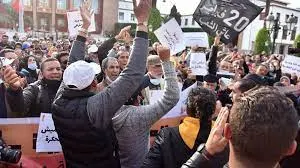Sudan: Renewed demonstrations demanding civilian rule and the release of detainees
Thousands of Sudanese citizens demonstrated to demand civilian rule and the release of political detainees.
Demonstrations renewed Monday in the capital, Khartoum, and a number of cities in Sudan, calling for civilian rule and the release of political detainees.
Thousands of demonstrators gathered in the Foundation area in the city of Bahri, north of Khartoum, holding pictures of the martyrs and detainees, according to eyewitnesses.
Witnesses stated that thousands of demonstrators from Omdurman and East Nile neighborhoods headed towards the city of Bahri, north of Khartoum, chanting slogans: "The people are stronger", "apostasy is impossible" and "blood is retribution for blood. We will not accept blood money."
The protesters, who came down in response to the call of the resistance committees and the gathering of professionals, raised Sudan's flags and slogans: "The military will not rule us", "The revolution is a people's revolution", "The authority is the authority of the people" and "The military is for the barracks."
Protesters also came out in the cities of Gedaref (east), Madani and Managil (central), Al-Obeid (west) and Port Sudan (east).
On Sunday, thousands of protesters demonstrated in several neighborhoods in Khartoum, the city of Bahri, and Omdurman (west), at the call of the coordinators of the resistance committees (activists) responsible for organizing the demonstrations, to demand "full civilian rule" and the release of "political detainees". Bahri city, north of Khartoum, according to the Sudan Doctors Committee.
Earlier, the Sudanese Professionals Association and the Resistance Committees (neighborhood activists) called to participate in the February 21 (Monday) million in Khartoum and the country's cities, under the slogan "Break the Chain", to demand civilian rule and the release of detainees.
Opposition forces and human rights organizations accuse the Sudanese authorities of arresting political leaders and dozens of activists in the "resistance committees".
While the head of the Sovereignty Council, Abdel-Fattah Al-Burhan, said Thursday that "the reports that affected some people (intended to be arrested) were made by the judicial authorities," stressing the independence of these authorities.
Since October 25, Sudan has witnessed protests, rejecting exceptional measures taken by Al-Burhan, most notably the imposition of a state of emergency and the dissolution of the Sovereignty Councils and the Transitional Ministers.
Mali: the military junta in power for 5 years
This is one of the main clauses of the five-year democratic transition plan approved by the Malian Parliament.
On Monday, lawmakers thus allowed the military to retain power despite the regional sanctions that this proposal had imposed on Mali.
120 members of the interim parliament out of 121 seats voted in favour.
"The agenda of this extraordinary session to focus exclusively on the examination of the bill revising the transition charter that we have just adopted almost unanimously by the members of the National Council of the Transition." declared Malick Diaw, president of the CNT.
After staging a coup in August 2020, Mali's new leaders initially promised to hold a poll in February 2022. But when the government offered to stay in power between six months and five years last December, the tensions have increased with ECOWAS but also with France.
The vote on this bill comes as the French government has officially announced the withdrawal of its troops, deployed in Mali for more than seven years.
"It is a feeling of joy and pride when the occupying forces leave your territory. We can only rejoice and congratulate the patriotic courage of the authorities, in particular the patriotic president, the liberator Assimi Goïta. When the Barkhane forces withdraw, it is the beginning of the end of the war in Mali and when the occupying forces leave Mali, it is the beginning of the end of the war in Mali." explained Ben Diarra, member of the CNT.
No lawmakers in the military-dominated legislature voted against the bill or abstained.
The bill does not mention the date on which a future election could be held.
A demonstration against the high cost of living takes to the Moroccan streets
Demonstrations took place on Sunday in Morocco, against the high cost of living. The recent rise in the prices of fuel and basic foodstuffs would be the basis of its popular claims. In Rabat, but also in Casablanca, but in Tangier, the demonstrators called for "freedom, dignity and social justice.
We must resist tyranny and corruption, promote the slogan "Get rid of this police state", and build democracy under the slogan of dignity, freedom, equality and social justice. The February 20 Movement must continue to liberate our country from injustice and tyranny. We must fight for dignity and social justice,” said a protester.
The government reacted explaining that the rise in the prices of certain consumer goods "was mainly explained by the unexpected economic recovery in the world and the continuous increase in the prices of cereals and petroleum products on the international market. The State should allocate more than 350 million dollars until the end of 2022 for the subsidy of the price of flour, according to Fouzi Lekjaa, the minister delegate to the minister of the Economy, in charge of the budget.
On Sunday, clashes took place in a rural market near the city of Kenitra (north) following in particular "unusual speculation at the price level of certain consumer products", indicated the local authorities, according to the agency of MAP press.
The authorities intervened to restore order and an investigation was opened into these incidents, according to the same source.



